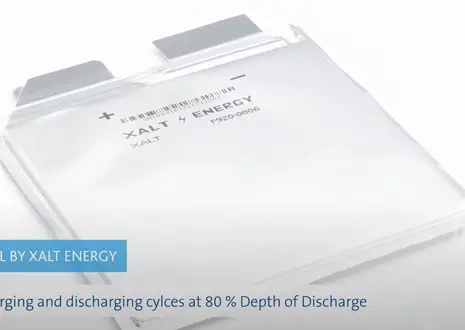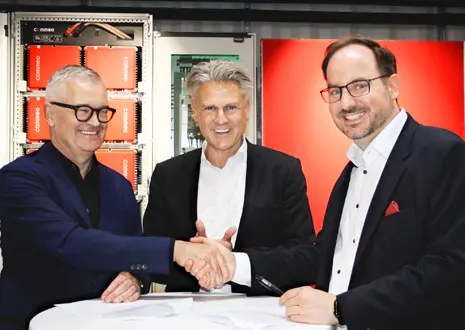
Training courses on commissioning Commeo energy storage systems
7. May 2021
Commeo receives prestigious ees award
21. July 2021Collaboration: Commeo and XALT Energy

Pouch cell © Xalt Energy

In an ever-changing energy landscape, stationary energy storage systems are taking on an increasingly important role. The cooperation between XALT Energy and Commeo, two pioneering companies in their respective fields, represents a groundbreaking solution to drive the energy transition and meet the increasing demands of industry and commerce. The combination of expertise and innovation enables the development of high-performance stationary energy storage systems that not only meet the challenges of energy supply, but also lay the foundations for a sustainable and reliable energy future.
Industrial demand and the energy transition
The demand for electrical energy is essential in industry and manufacturing, especially in the age of Industry 4.0, which relies on high levels of networking and automation. However, this increasing energy demand contrasts with the growing importance of renewable energy. The fluctuating nature of solar energy and wind power raises challenges with regard to the stability of the power supply, especially during peak load periods. The need to ensure security of supply has led medium-sized companies to increasingly consider the implementation of stationary energy storage systems.
A pioneer in this industry is Commeo GmbH, under the leadership of Managing Director Michael Schnakenberg. Within seven years, Commeo has experienced a remarkable development from a start-up to an emerging medium-sized company. The strategic partnership with companies such as XALT Energy and Rittal, a European market leader for electrical cabinets, has not only given Commeo access to new markets, but also created a platform for high-quality storage systems in various industries.
Innovative Partnership: XALT Energy and Commeo
A striking feature of this partnership is the integration of XALT Energy’s high-performance, long-life battery cells into Commeo’s stationary energy storage systems. The use of XALT cells in these systems marks a significant step, as these cells were originally developed for heavy-duty transportation, including buses, trucks and ships. The close collaboration between the two companies enabled seamless integration, increasing XALT Energy’s competitiveness in its core markets while gaining access to a new market for its battery cells.
The systems developed by Commeo use two different types of XALT Energy cells, each designed to meet different requirements. This enables a wide range of applications, from high-capacity cells for low charge and discharge rates to cells that can achieve high charge and discharge rates.
Wide range of applications
The potential applications of stationary storage systems are diverse and range from supporting uninterruptible power supply during power outages to buffering power peaks during normal operation. This can help reduce peak loads and associated costs by helping companies optimize their power charges. An example of this is the use of photovoltaic systems to reduce a company’s carbon footprint and accelerate carbon-neutral production.
The growing demand for electric vehicles has also increased the need for charging stations. Commeo sees growing demand here from parking garages, underground garages and hotel operations. The transformation of mobility requires a new type of energy infrastructure that can be effectively supported by stationary storage systems.
Closing a gap and setting a standard
Commeo specializes in developing customized solutions for medium-sized businesses to meet their individual requirements and potential. By defining an industry standard and working with companies like XALT Energy, Commeo is closing a gap in the field of stationary storage systems. This standard not only brings clarity and guidance to a complex industry, but also paves the way for sustainable energy systems in the future.
The cooperation between XALT Energy and Commeo is a prime example of the synergies that can be created through strategic partnerships. By combining the strengths and competencies of both companies, they are helping to shape a sustainable and efficient energy future that meets the needs of industry and commerce while paving the way for innovative technologies.

By loading the video, you agree to YouTube's privacy policy.
Learn more





